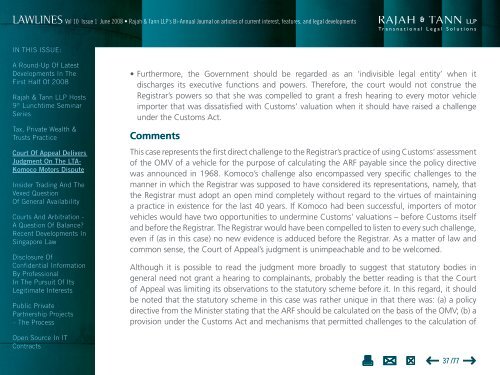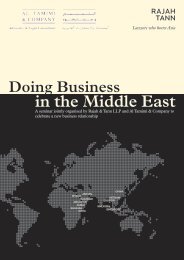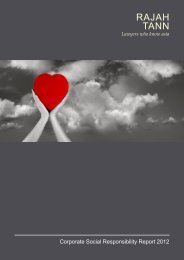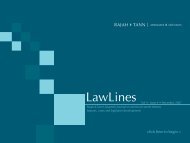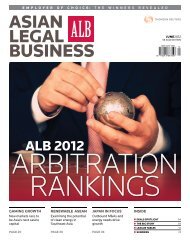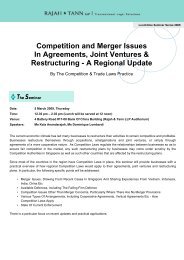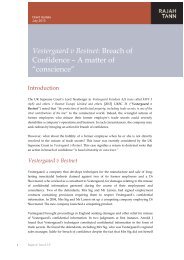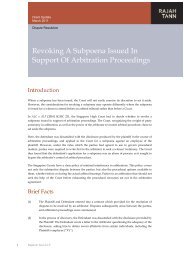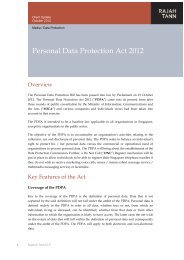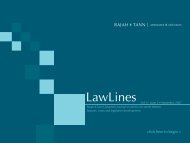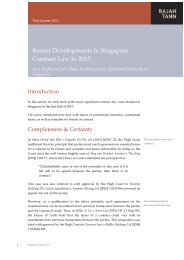Lawlines Vol 10 Issue 1 - eOASIS - Rajah & Tann LLP
Lawlines Vol 10 Issue 1 - eOASIS - Rajah & Tann LLP
Lawlines Vol 10 Issue 1 - eOASIS - Rajah & Tann LLP
Create successful ePaper yourself
Turn your PDF publications into a flip-book with our unique Google optimized e-Paper software.
<strong>Vol</strong> <strong>10</strong> <strong>Issue</strong> 1 June 2008 • <strong>Rajah</strong> & <strong>Tann</strong> <strong>LLP</strong>’s Bi-Annual Journal on articles of current interest, features, and legal developmentsIN THIS ISSUE:A Round-Up Of LatestDevelopments In TheFirst Half Of 2008<strong>Rajah</strong> & <strong>Tann</strong> <strong>LLP</strong> Hosts9 th Lunchtime SeminarSeriesTax, Private Wealth &Trusts PracticeCourt Of Appeal DeliversJudgment On The LTA-Komoco Motors DisputeInsider Trading And TheVexed QuestionOf General AvailabilityCourts And Arbitration -A Question Of Balance?Recent Developments InSingapore LawDisclosure OfConfidential InformationBy ProfessionalIn The Pursuit Of ItsLegitimate InterestsPublic PrivatePartnership Projects– The Process• Furthermore, the Government should be regarded as an ‘indivisible legal entity’ when itdischarges its executive functions and powers. Therefore, the court would not construe theRegistrar’s powers so that she was compelled to grant a fresh hearing to every motor vehicleimporter that was dissatisfied with Customs’ valuation when it should have raised a challengeunder the Customs Act.CommentsThis case represents the first direct challenge to the Registrar’s practice of using Customs’ assessmentof the OMV of a vehicle for the purpose of calculating the ARF payable since the policy directivewas announced in 1968. Komoco’s challenge also encompassed very specific challenges to themanner in which the Registrar was supposed to have considered its representations, namely, thatthe Registrar must adopt an open mind completely without regard to the virtues of maintaininga practice in existence for the last 40 years. If Komoco had been successful, importers of motorvehicles would have two opportunities to undermine Customs’ valuations – before Customs itselfand before the Registrar. The Registrar would have been compelled to listen to every such challenge,even if (as in this case) no new evidence is adduced before the Registrar. As a matter of law andcommon sense, the Court of Appeal’s judgment is unimpeachable and to be welcomed.Although it is possible to read the judgment more broadly to suggest that statutory bodies ingeneral need not grant a hearing to complainants, probably the better reading is that the Courtof Appeal was limiting its observations to the statutory scheme before it. In this regard, it shouldbe noted that the statutory scheme in this case was rather unique in that there was: (a) a policydirective from the Minister stating that the ARF should be calculated on the basis of the OMV; (b) aprovision under the Customs Act and mechanisms that permitted challenges to the calculation ofOpen Source In ITContracts37 /77


